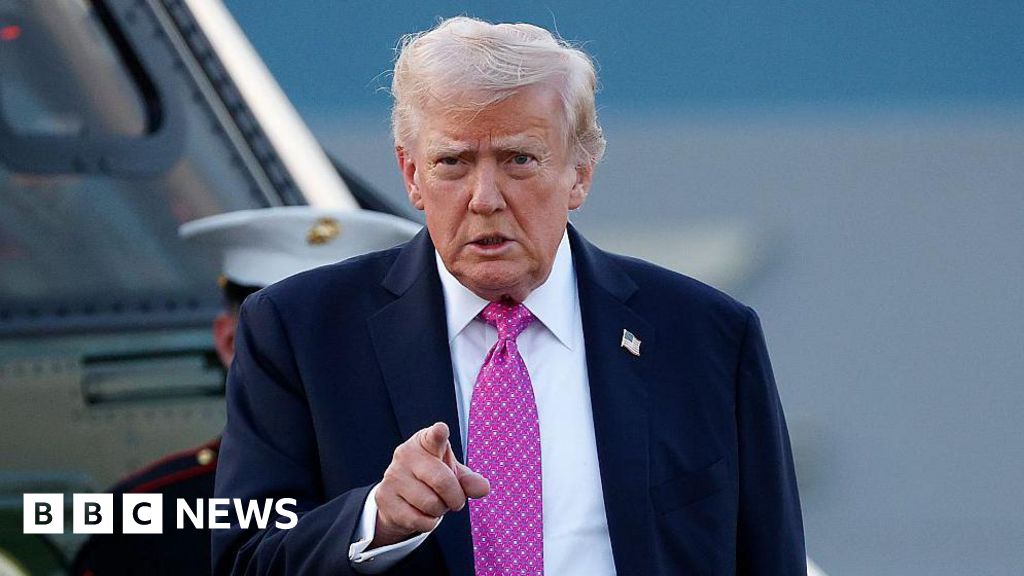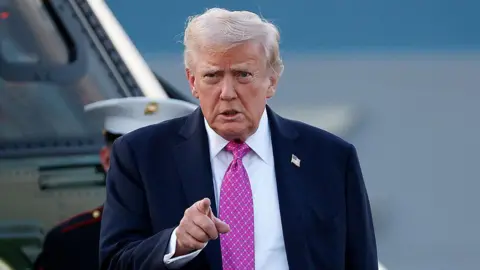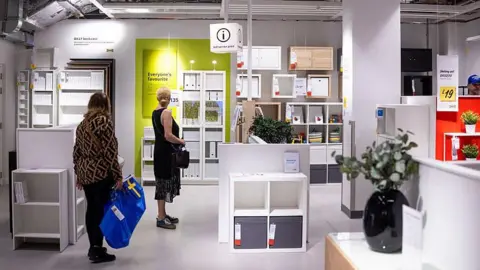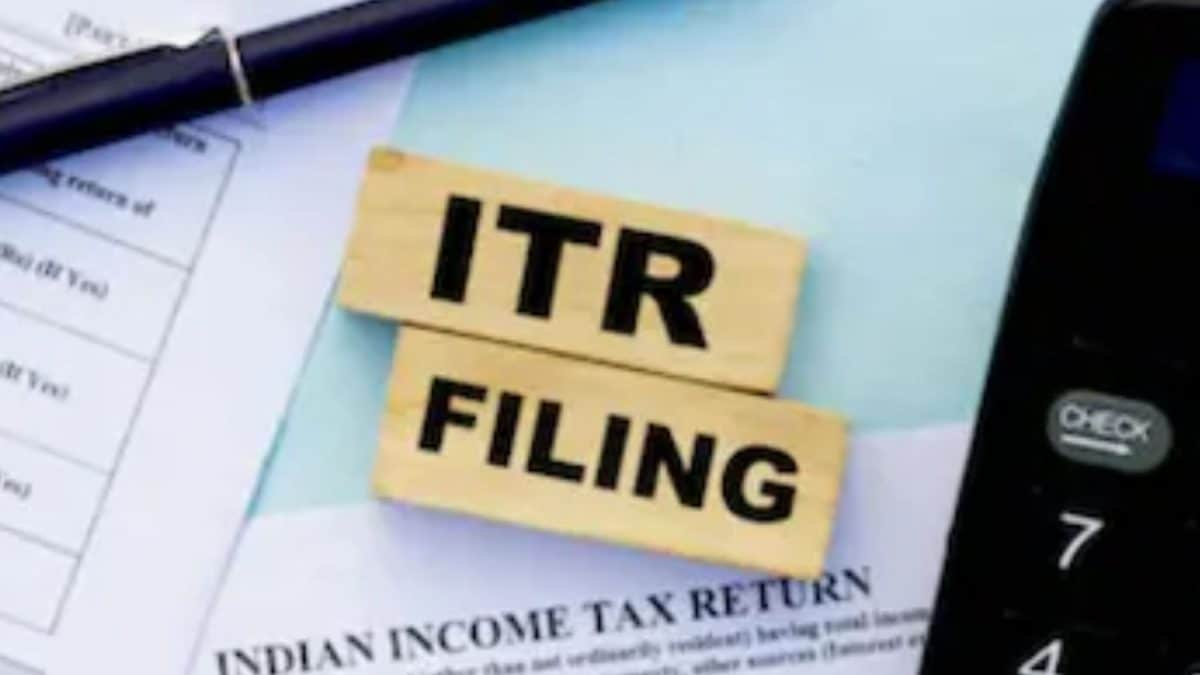Business
Trump announces new tariffs on trucks, drugs and kitchen cabinets

Osmond Chia and
Charlotte Edwardsbusiness reporters
 Getty Images
Getty ImagesUS President Donald Trump has announced a new wave of tariffs, including a 100% levy on branded or patented drug imports from 1 October unless a company is building a factory in the US.
Washington will also impose a 25% import tax on all heavy-duty trucks and 50% levies on kitchen and bathroom cabinets, the president said as he unveiled the industry-focused measures.
“The reason for this is the large scale ‘FLOODING’ of these products into the United States by other outside Countries,” Trump wrote on his Truth Social platform on Thursday, citing the need to protect US manufacturers.
The announcements come despite calls from US businesses for the White House to not impose further tariffs.
However, Neil Shearing, chief economist at Capital Economics, said the tariff announcement on pharmaceuticals was “not quite as big a move as it appears at first sight”.
This was due to the exemptions available to generic drugs and to those firms building factories in the US.
“Many of the world’s largest pharmaceutical companies either already have some production in the US or have announced plans to build production in the near future,” he said.
The European Federation of Pharmaceutical Industries and Associations has called for “urgent discussions” to make sure Trump’s plans for new tariffs do not cause any harm to patients in the EU or the US.
The UK exported more than $6bn (£4.5bn) worth of pharmaceutical products to the US last year, according to the United Nations.
In the trade agreement signed by the US and UK in June the two countries said they intended to negotiate “significantly preferential treatment outcomes on pharmaceuticals”.
In response to Trump’s latest announcement, a UK government spokesperson said: “We know this will be concerning for industry, which is why we’ve been actively engaging with the US and will continue to do so over the coming days.”
Among the UK’s biggest pharmaceutical companies, GlaxoSmithKline already has US manufacturing plants and last week pledged to invest $30bn (£22bn) in research and manufacturing in the US over the next five years.
AstraZeneca also has plants in the US and in July said it planned to invest $50bn in the country by 2030.
William Bain, head of trade policy at the British Chambers of Commerce, said: “The UK’s leading pharmaceutical companies have committed to significant investment in the US, including in advanced manufacturing. We believe this should give them protection from any new duties.”
In the past couple of weeks, several pharmaceutical companies have pulled investment from the UK, citing a poor environment for the sector.
But Jane Sydenham, investment director at Rathbones, said the need to focus on the US was a key factor in these decisions.
“I think there’s been this ongoing narrative that the UK can’t attract investment and we’re a low growth economy,” she told the BBC’s Today programme.
“But the reality in this particular sector is that it is really more about Donald Trump’s agenda and the uncertainty that’s creating for these companies and where they might need to invest to handle the tariff proposals.”
 Bloomberg via Getty Images
Bloomberg via Getty ImagesThe tariffs on heavy trucks would protect US manufacturers from “unfair outside competition” and the duties would help lift American companies such as Peterbilt and Mack Trucks, Trump said.
The new levies on kitchen and bathroom cabinets, as well as some other furniture, were in response to high levels of imports, which hurt local manufacturers, the president said.
He added that the US would start charging a 30% tariff on upholstered furniture from next week.
Swedish furniture giant Ikea said the tariffs on furniture imports make doing business “more difficult”.
“The tariffs are impacting our business similarly to other companies, and we are closely monitoring the evolving situation.”
Trump’s tariff policies have been a key feature of his second term in the White House.
His sweeping tariffs on more than 90 countries came into effect in early August, as part of his policies aimed at boosting jobs and manufacturing in the US, among other political goals.
Trump had previously imposed sector-specific tariffs on steel, copper, aluminium, cars and vehicle components.
Earlier this year, the US Chamber of Commerce urged the White House to not introduce new tariffs, arguing that many parts used in truck production are sourced “overwhelmingly” from countries like Mexico, Canada, Germany, Finland and Japan.
Mexico and Canada are among the biggest suppliers of parts for medium and heavy-duty trucks, accounting for more than half of total US imports in the sector last year, said the chamber.
It warned that it was “impractical” to expect many of these parts to be sourced domestically, resulting in higher costs for the industry.
The new tariffs favour domestic producers but are “terrible” for consumers as prices are likely to rise, said trade expert Deborah Elms from research firm Hinrich Foundation.
The levies would cover more products at higher rates than Trump’s reciprocal tariffs, which were aimed at correcting trade imbalances with other countries.
These industry-specific import taxes could serve as a back-up plan to secure revenues as Trump’s sweeping duties on global trading partners are being challenged in court, said Ms Elms.
Business
India’s GDP Projected To Grow 7.4% In FY26, RBI To Keep Rates Unchanged In Feb

New Delhi: India’s real GDP growth is projected at 7.4 per cent for FY26, up from 6.5 per cent in FY25, a report has said, highlighting seasonal pick up in electricity, mining and construction sectors. The report from ICRA said that growth is expected to ease below 7 per cent in H2 FY26 from 8 per cent in H1 because of an unfavourable base effect and moderation in exports.
The report expects a pause in the February 2026 policy review by the RBI, with future decisions to be guided by the FY27 Union Budget and evolving inflation-growth dynamics. Meanwhile, economic activity remained healthy in Q3 FY26, aided by GST rate‑cut led festive demand and seasonal upticks in some sectors.
ICRA expects consumption volumes of goods and services as well as manufacturing volumes to have benefited from GST cuts and festival demand in Q3, though the export drag may intensify in H2 unless a US trade deal materialises.
The firm forecasts CPI inflation to plunge to 2 per cent in FY26 from 4.6 per cent in FY25, with WPI at 0.4 per cent. CPI rose to 0.7 per cent in November 2025 from 0.3 per cent in October, due to a narrower deflation in food and beverages.
Additionally, mining and construction activity as well as electricity demand are set to witness a seasonal pick up in the coming months, after the easing owing to rainfall-related disruptions, it said. “Cement production is expected to grow 6.5–7.5 per cent in FY26. Steel demand growth may moderate to 7–8 per cent after strong previous years. Electricity demand growth is muted at 1.5–2 per cent for FY26,” the report noted.
It also flagged external risks including delay in the US-India trade deal, and global policy changes affecting service exports. Domestic risks encompass subdued export growth, monsoon variability, fiscal constraints, and inflationary pressures from commodity prices.
Business
UAE salaries 2025: What workers really earn without a minimum wage | World News – The Times of India

As of 2025, the UAE has not enacted a formal nationwide minimum wage for all private-sector workers. The current labor framework, outlined in Federal Decree-Law No. 33 of 2021, provides the Ministry of Human Resources and Emiratisation (MoHRE) with the legal authority to establish a national wage floor but no binding law has yet been implemented.Instead, salaries are regulated through employment contracts and visa-related requirements. Employers must pay wages via the Wage Protection System (WPS); a government-monitored payroll platform. Failure to comply can result in suspension of new work permits, fines, and company blacklisting.Recent reforms have expanded WPS coverage to include domestic and semi-professional workers like private teachers, caregivers, nannies, and farm technicians. This shift reflects a broader move toward labor standardization and income protection across job categories.
What workers typically earn: A benchmark view
Although no legally enforced floor exists, salary benchmarks function as de facto minimums in many professions. These reflect industry standards, cost of living, and immigration thresholds.
Domestic workers:
Housemaids, nannies, and drivers employed in homes now fall under stricter payment rules, with most salaries ranging from AED 1,200 to AED 1,800/month (₹28,044–₹42,066), depending on experience and nationality. WPS compliance is mandatory for these roles, ensuring regular wage transfers and legal accountability for employers.
Construction and skilled trades:
Labourers and tradesmen form the backbone of the UAE’s infrastructure sector. While base pay for unskilled labourers often starts at AED 1,200–1,500/month (₹28,044–₹35,055), skilled tradespeople such as electricians, plumbers, and masons can earn between AED 2,000 and AED 4,500/month(₹46,740–₹105,165). Many of these roles are protected under labour laws that mandate written contracts, paid leave, and access to dispute resolution.
Retail and service staff:
Workers in retail outlets, supermarkets, cafes, and delivery platforms typically earn AED 2,500 to AED 4,000/month (₹58,425–₹93,480). In these sectors, wage variability is influenced by location (Dubai salaries often exceed those in Sharjah or Ajman), nationality, and employer size.
Office and administrative roles:
Clerical staff, receptionists, and data entry assistants generally receive AED 3,000 to AED 5,000/month (₹70,110–₹116,850), with larger companies or public sector institutions offering higher packages. For visa eligibility especially family sponsorship—employees must earn a minimum of AED 4,000/month (₹93,480), or AED 3,000 (₹70,110) plus housing.
University graduates and skilled technicians:
For professionals with technical or university qualifications, MoHRE guidelines recommend salaries of at least AED 5,000 to AED 12,000/month (₹116,850–₹280,440), depending on the nature of the role. Engineers, IT professionals, and finance specialists typically command salaries within or well above this range.
Visa rules and wage enforcement
Though no national wage law exists, immigration requirements act as an indirect filter. For example:
- Family visa sponsorship: The UAE mandates a minimum salary of AED 4,000 (or AED 3,000 plus accommodation) for an expatriate to sponsor dependents.
- Golden Visa applicants in employment-based categories must earn at least AED 30,000/month (₹701,100), particularly in scientific or technical fields.
- Employment contracts must specify wages in UAE dirhams and be registered with MoHRE to be legally recognised.
The Wage Protection System ensures salaries are paid into local bank accounts within 10 days of the due date. Any delay beyond 15 days triggers automatic alerts, and repeated violations can lead to bans on new hiring.
Rising costs and reform pressures
Over the past few years, Dubai and Abu Dhabi have seen substantial increases in rent, school fees, and healthcare costs. As a result, there is growing pressure on authorities to formalise wage protections and align pay standards with inflation.While some companies voluntarily adjust salaries to retain talent, many low-income workers remain vulnerable to economic shocks. Calls for an indexed minimum wage system adjusted annually to match living costs, growing louder, particularly from labour advocates, unions in labour-sending countries, and international observers.
The road ahead: Formal minimum wage in sight?
Although the UAE has avoided a one-size-fits-all national wage model, change is on the horizon:
- Free zones may begin enforcing internal wage floors for certain industries to standardise competition.
- Sector-specific minimum wages could emerge in healthcare, hospitality, and logistics where migrant workers dominate and wage disparity is high.
- Public-private harmonisation efforts may also push for parity, as Emirati workers often earn significantly more than expatriate counterparts in similar roles.
MoHRE has already hinted at “exploring mechanisms” to address income disparities. If implemented, a flexible minimum wage varying by sector or emirate which could strike a balance between labour protection and economic competitiveness.
Verdict
While there is no official minimum wage in the UAE today, the country is moving toward greater wage transparency, stronger payment enforcement, and benchmark-based income protection. Domestic workers, skilled labourers, and administrative staff now operate under more structured payment conditions—backed by technology and labour law.As the UAE positions itself as a global employment hub, expectations for formal wage regulation will continue to rise. A future where salaries are legally anchored to fair benchmarks seems not only possible but likely.
Business
Revised Vs Belated ITR: What To Do If Your Tax Refund Is On Hold

Last Updated:
Taxpayers facing refund holds due to mismatches must act before December 31.

Knowing revised and belated ITRs can help avoid penalties. (representative image)
The Income Tax Department has recently sent messages and emails to many taxpayers saying their refunds are on hold. The reason given is a mismatch in the income tax return (ITR) details. In these alerts, taxpayers have been asked to take action before December 31, this year, to fix the issue.
This has caused confusion, especially among those who believed they had filed their returns correctly. The department has also stepped up checks on cases where it feels excess refunds may have been claimed. As a result, many taxpayers are now unsure about the right way to respond.
In its email, the department reportedly stated, “As the time limit for filing of revised ITR for A.Y. 2025-26 will expire on 31 December 2025, you are requested to avail this opportunity to file Revised Return within the due date if so required. Alternatively, you may file an updated return w.e.f. 1 January 2026, however, subject to an additional tax liability.”
With the deadline nearing, it is important to understand the options available after the original ITR due date has passed.
What Is A Revised ITR?
A revised ITR allows taxpayers to fix mistakes made in the original return. These errors could include missing income details, wrong deductions, calculation errors, or choosing the wrong ITR form. Under Section 139(5) of the Income Tax Act, 1961, taxpayers can submit a revised return to correct such issues.
A revised ITR can also be filed if the refund amount needs to be increased or reduced based on corrected information.
What Is A Belated ITR?
A belated ITR is filed when a taxpayer misses the original filing deadline. As per Section 139(1) of the Income Tax Act, this return can be submitted until December 31 of the assessment year. However, filing late usually means paying a penalty.
Taxpayers who miss the deadline are advised to file a belated return instead of not filing at all, as non-filing can lead to further trouble.
Why File A Revised ITR?
A revised return is useful when the original ITR has errors. These may include underreported or overstated income, wrong deductions, incorrect refund claims, or other filing mistakes.
As quoted by Livemint, CA, Shefali Mundra, tax expert at ClearTax, says, “There is no penalty for filing a revised return within the prescribed timeframe.”
Revised ITR vs Belated ITR Explained
“A revised return is filed to correct errors or omissions in a previously filed return (either original or belated). It can be filed before 31 December of the relevant assessment year or before the department completes the assessment. The revised return is linked to the original filing, and the taxpayer can make corrections without any penalties, apart from paying any additional taxes and interest,” CA Mundra told Livemint.
She added that a belated ITR is treated differently.
“A belated return is filed after the original due date for submitting the return, which is typically 31 July for individual taxpayers. A belated return is still considered an original return, and it is subject to a late filing fee under Section 234F (up to Rs 5,000, depending on the income) and interest on unpaid tax. Additionally, certain benefits, such as carrying forward losses, may not be available when filing a belated return,” CA Mundra also stated.
Delhi, India, India
December 27, 2025, 10:31 IST
Read More
-
Sports7 days ago
Alabama turned Oklahoma’s College Football Playoff dream into a nightmare
-

 Entertainment7 days ago
Entertainment7 days agoRare look inside the secret LEGO Museum reveals the system behind a toy giant’s remarkable longevity
-

 Business1 week ago
Business1 week agoGold prices in Pakistan Today – December 20, 2025 | The Express Tribune
-

 Business1 week ago
Business1 week agoRome: Tourists to face €2 fee to get near Trevi Fountain
-

 Politics1 week ago
Politics1 week agoUK teachers to tackle misogyny in classroom
-

 Entertainment7 days ago
Entertainment7 days agoIndia drops Shubman Gill from T20 World Cup squad
-

 Entertainment1 week ago
Entertainment1 week agoZoe Kravitz teases fans with ring in wedding finger
-

 Tech7 days ago
Tech7 days agoWe Tried and Tested the Best Gifts for Plant Lovers With Our Own Green Thumbs






